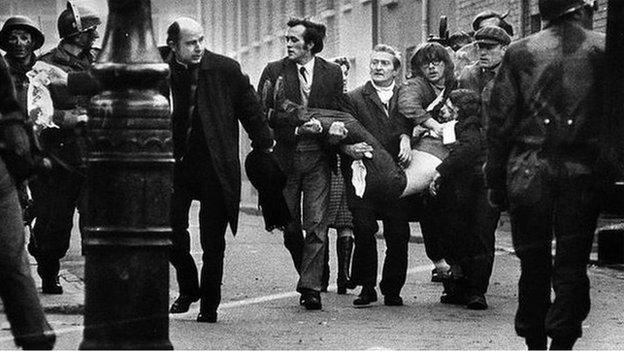Bloody Sunday: No arrests until soldiers' bid to stop murder probe is heard
- Published

Thirteen people were killed on Bloody Sunday in January 1972
Police in Northern Ireland have given a commitment not to arrest any more former soldiers over the Bloody Sunday killings until a legal bid to stop the murder investigation has been heard.
Thirteen civilians died after the Army opened fire on a civil rights march in Londonderry in 1972.
A judicial review application by seven ex-soldiers who could face questioning is set to be heard next week.
Lawyers for the soldiers have said the murder probe is politically motivated.
The Police Service of Northern Ireland (PSNI) began the inquiry in 2012.
Order
A High Court judge will decide whether or not the former soldiers have an arguable case to launch a legal challenge against the police.
Belfast solicitors firm Madden and Finucane is representing some of the families of Bloody Sunday victims and some of those wounded in the shootings.
James Madden from the firm said they were considering an order by a judge that the families of those killed are not "directly affected" by the application.
Last week, the PSNI made its first arrest over the Bloody Sunday killings, questioning a 66-year-old former member of the Parachute Regiment.
The ex-soldier was arrested in County Antrim and interviewed at a police station in Belfast before being released on bail the following day.
Apology
Bloody Sunday was one of the most controversial days in Northern Ireland's history.
The fatal shootings, were the subject of a 12-year public inquiry led by Lord Saville.
The Saville Report, published in 2010, unequivocally blamed the army for the civilian deaths and exonerated those who were killed.
Prime Minister David Cameron accepted the findings of the report and made a public apology to the victims.
Clarification 9 April 2019: This article was amended to remove a reference to the death of John Johnston. This reflects the Bloody Sunday Inquiry's finding about Mr Johnston's death several months after he was wounded in Derry on 30 January 1972. The inquiry report states that his death was "not the result of any of the wounds he sustained on Bloody Sunday".
- Published11 November 2015